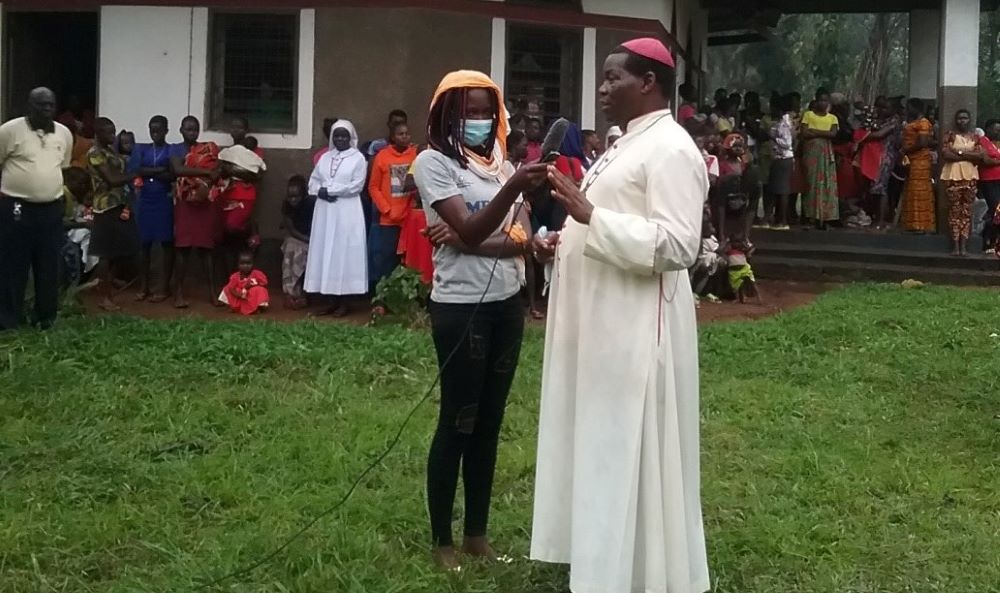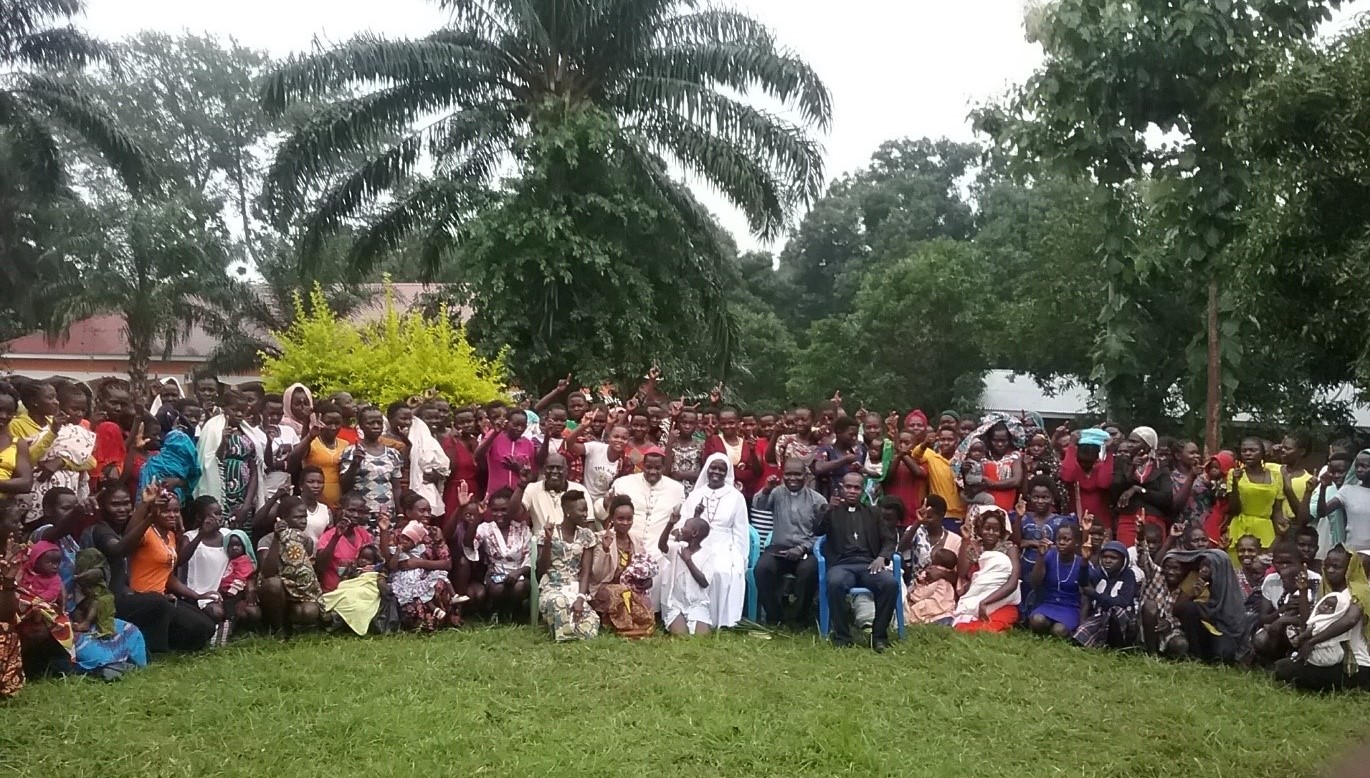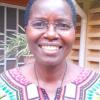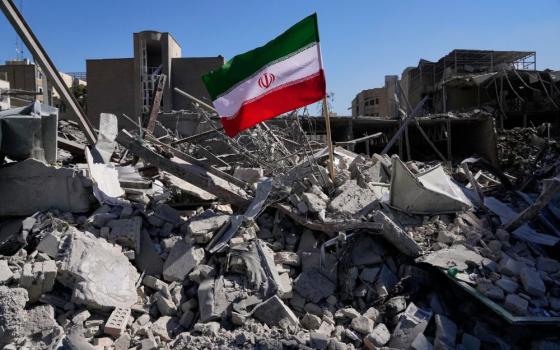
Bishop Eduardo Hiiboro Kussala of the Diocese of Tombura-Yambio, South Sudan, opens a workshop designed to empower girls June 4. (Courtesy of Scholasticah Nganda)
A question begging for an answer struck me: Why this workshop? Then I wondered: What gaps, if any, would be bridged if young South Sudanese women were offered this capacity-building opportunity? These critical questions linger in my mind as I began to write this column.
I thought of a key assertion in a blog posted on the World Bank's website that might offer valuable answers to these two questions. A May 26 post observed, "Empowering women holds the key to unlocking peace, development, and a more prosperous future for all people in South Sudan."
In concurrence with this observation, the Diocese of Tombura-Yambio's capacity-building workshop for young women — run by Sr. Jane Rose Onzia, a Sacred Heart Sister and a member of Solidarity with South Sudan — sought to give the young women skills and human knowledge for a better life. The organization, supported by the International Union of Superiors General and the Union of Superior General in collaboration with the Sudan Catholic Bishops' Conference, "aims to create self-sustainable educational, health and pastoral institutions and programs that will help to empower South Sudanese people to build a just and peaceful society."
Living in South Sudan for the past three years, I have become acutely aware of the marginalization endured by women of this young nation. As an African woman — one who celebrates the gift of womanhood and its place in humankind — I dare to say that the place of women and girls in South Sudan's society makes my heart grieve almost every waking day of my life. But I do know that all is not lost. I am also a firm believer in the power and determination of will.

The Diocese of Tombura-Yambio's capacity-building workshop for young women was run by Sacred Heart Sr. Jane Rose Onzia. Bishop Eduardo Hiiboro Kusala opened the workshop. (Photo courtesy of Diocese of Tombura-Yambio)
My perception that South Sudanese women and girls are actors in their own liberation is what gives me and many others working in women's empowerment the impetus to spearhead capacity-building initiatives for women and girls in this largely patriarchal society. I am lucky to be a member of Solidarity with South Sudan; we are a group of religious men and women with a passion for women’s empowerment.
Like me, you may be tempted to ponder: Who will give voice to thousands of vulnerable women and girls of South Sudan? In a country that is struggling to emerge from the ravages of war endured over decades, with a failing economy, skyrocketing food prices, insecurity and natural disasters like floods, how is it possible to list "empowering young girls" among the key issues of concern in this impoverished nation? I do not want to pretend there are easy answers to these critical questions, nor resources readily available to facilitate such human development! Nevertheless, creative imagination does sometimes offer needed hope in seemingly challenging situations.
Believing in the Chinese proverb "A journey of a thousand miles begins with a single step," Solidarity with South Sudan's pastoral team has partnered with the Diocese of Tombura-Yambio to empower 300 young girls, the majority of whom have dropped out of school. Some of these girls were pregnant or lacked school fees. Some dropped out of school because of early and forced marriages, Many young married or unmarried mothers with increased vulnerability and responsibilities.
As we devised a psychosocial program for these young girls, we were aware that the circumstances surrounding them contribute — to a large extent — to their low level of confidence and self-esteem. No doubt, the many challenges facing these young women can appear unsurmountable. But all is not lost.
Out program offers lessons on life skills, trauma healing, self-esteem, the art of forgiveness, the beauty of being a woman and learning conflict-resolution skills. These efforts are beginning to bear fruit. It is encouraging to see the impact of these workshops. Significantly, some of them are reclaiming their lost self-confidence and are poised to confront, even in small ways, many of the challenges facing them, which have pinned them down to a social status restricted by poverty.
After the three training sessions with the girls, Sister Jane said:
Working with these young girls has been an eye-opener for me. I have been privileged to witness to a miracle born out of affliction. Yes, the determination to overcome challenges emanating from the circumstances of their lives, has showcased the 300 girls as being more than what has befallen them.
In her work, Onzia has helped the young women gain knowledge and skills required to overcome some of the challenges they are confronting.
Although Sister Jane worked with girls in the six deaneries of the Catholic Diocese of Tombura-Yambio, what almost took her breath away was an experience one girl shared during a session on trauma healing. "If I were not a trained counsellor and a skilled facilitator, I would have wept in front of the participants," sister said.
Advertisement
It was the story of Poni (not her real name), who experienced a painful rape by a family member, that Sister Jane found heart breaking. Worse still, the circumstances surrounding this traumatic event, as Poni explained, were unfathomable. It must be noted that Poni is one among thousands of South Sudanese women and young girls who are preyed upon by old and young South Sudanese men, some of whom are devoid of any feeling of respect and care for the other — especially a young woman. These men violate women's human rights and have been proven to perpetrate these crimes in broad daylight.
This is gender-based violence (GBV) in South Sudan. The question of whether this country has built an adequate mitigating strategy for GBV is beyond the scope of this column. Nevertheless, I long for the day when women and girls in South Sudan will breathe a sigh of relief for their government's provisions for the care and security of youth — and female youth in particular, in the flower of their growing womanhood into maturity. The current lack of such services for women only increases their marginalization and vulnerability.
We must acknowledge that the multiple challenges women and girls face in South Sudan are scary. But they somehow continue to demonstrate a remarkable resilience and a unique determination to beat all the odds.
As Solidarity with South Sudan seeks to expand its women and girls' empowerment program across the seven Catholic dioceses of South Sudan, we are energized by the enthusiasm of the young girls in the program. The determination of these girls to be key players in their own socioeconomic liberation ignites Solidarity with Sudan's commitment to increased collaboration with the Diocese of Tombura-Yambio, for the benefit of the young women.
May the Lord continue to bless this good work begun through the hands of many collaborators with the local church of South Sudan.






